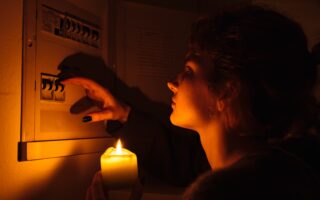French News Digest: Residency Applications Site Is Live – Apply Now!

This week’s news update includes details of the newly launched residency website for Britons in France, as well as Covid-19 updates.
Website for Britons’ residency applications is now live
After several delays, finally the online residence permit application procedure for British nationals and their family members residing in France or intending to settle in France before December 31 2020 is up and running.
You can access the site, which details what paperwork and photographs (scanned pdf, jpeg or png files) are required, here.
After validating your request online, a confirmation of your request will be sent to you by email with a registration acknowledgement number.
Once your file has been processed, an email will be sent to you by the prefecture in order to set an appointment at the prefecture to finalise your application (receipt of the photograph and taking of fingerprints).
Your residence permit will then be sent to your home by post.
FrenchEntrée strongly advises that you read the in-depth Frequently Answered Questions here first.
All applications must be filed on the website before July 1 2021 to obtain a residence permit bearing the words “UK withdrawal agreement from the EU”. Paper files will not be accepted by prefectures.
Possession of the residence permit will be compulsory from October 1 2021 for anyone over the age of 18, and even if you already hold a valid residence permit, or you recently applied for a residence permit at the prefecture, or you have applied for, but not yet attained, French nationality, you must complete a new application.
However, the process for those who have already been living in France for more than five years and who already have a carte de séjour permanent is much more simplified.
The residence permit is free and will allow residents in France to travel in the other States belonging to the Schengen area for periods not exceeding three months.
Covid-19 update
According to this week’s update from Santé Public France, France reported a total of 85 Covid-19 related deaths in the 24 hours to Sunday, bringing the total number of deaths to 33,477. In the same 24-hour period there were 29,837 new cases of contamination.
The overall number of deaths in EHPADs (care homes) and EMS (medico-socio centres) stands at 10,912 while the total number of deaths in hospital is 22,565.
France has 7,530 people hospitalised with Covid-19, including 1,343 serious cases in intensive care. The test positivity rate has risen again to 13.2%.
84 departments are currently in a situation of ‘high vulnerability’ with the regions of Île-de-France, Auvergne-Rhône-Alpes, Hauts-de-France and Grand Est accounting for 70% of patients in intensive care.
Hospital Covid-19 case totals and number of deaths to Sunday, by region:
- Ile-de-France: 3,054 people hospitalised and 27 deaths in 24 hours
- Grand Est: 417 hospitalised and 1 death in 24 hours
- Hauts de France: 1,182 people hospitalised and 5 deaths in 24 hours
- Auvergne Rhône Alpes: 1929 hospitalised and 18 deaths in 24 hours
- Provence-Alpes Côte d’Azur: 1159 hospitalised and 8 deaths in 24 hours
- Brittany: 214 hospitalised and 0 deaths in 24 hours
- Normandy: 486 people hospitalised and 3 deaths in 24 hours
- Nouvelle-Aquitaine: 483 people hospitalised and 4 deaths in 24 hours
- Pays de la Loire: 311 people hospitalised and 1 death in 24 hours
- Occitanie: 793 hospitalisations and 13 deaths in 24 hours
- Centre-Val de Loire: 247 people hospitalised and 0 deaths in 24 hours
- Burgundy-Franche-Comté: 302 hospitalisations and 3 deaths in 24 hours
- Réunion: 52 hospitalised patients and 0 deaths in 24 hours
- Guadeloupe: 158 hospitalised and 1 death in 24 hours
France currently has 1,750 clusters, including 62 new ones and 355 in Ehpads.
Macron announces curfew for major cities
Last Wednesday, October 14, the President of the Republic, Emmanuel Macron, announced that a curfew would be introduced from Saturday October 17 at midnight.
The curfew affects Paris as well as the entire Ile-de-France region, plus eight other major cities – Grenoble, Lille, Lyon, Aix-Marseille, Montpellier, Rouen, Saint-Etienne and Toulouse – and will be in place from 9pm to 6am for a minimum of four weeks (though the government is seeking an extension of two further weeks).
“We must stop the spread of the virus to protect others, the elderly and the most vulnerable; we must protect our health system and our carers,” said Macron. “We are all connected to each other. These 20,000 new cases a day will have to be reduced to the 3,000/4,000 cases we can manage.”
As predicted, however, he ruled out a nationwide lockdown. “It would be disproportionate to reconfine the country; we have to reduce the most dangerous private contacts, with people who are not in our family unit,” explained the President.
“If we keep this curfew for six weeks, we think we’ll be able to gradually reopen the closed establishments. Six weeks is the time that seems useful to us. The objective is to be able to continue to have an economic life, so that our fellow citizens can continue to have a normal life and work.”
As for those who need to travel home in time for the curfew, Macron said: “If you have 30 minutes of transport, you must make arrangements to be home by 9pm”.
France under state of emergency, plus a new ‘rule of six’
The state of health emergency has been restored in France after being lifted on July 10.
“The Covid-19 epidemic constitutes a health catastrophe that, by its nature and gravity, endangers the health of the population”, said a report released by France’s Council of Ministers.
Among other measures introduced by Macron is the ‘rule of six’, meaning that people are asked to limit private gatherings to no more than six people who do not come from the same household. Families with seven or more members can continue as usual.
The same ‘rule of six’ now also applies to the maximum number of people who can sit at any single restaurant table.
Places like cinemas and theatres are required to leave every other seat empty.
Prime Minister Jean Castex added more detail the next day, saying that travel during curfew hours was permitted for trips to the hospital or pharmacy or, if work hours required it (télétravail, or working from home, is still recommended but not obligatory), a special certificate would need to be produced as proof. Pre-booked tickets for planes and trains that arrive after the curfew will be allowed.
The fine for those caught breaking the curfew will be €135.
Marches to remember beheaded teacher
Thousands of people attended rallies across France on Sunday to remember Samuel Paty, the teacher who was beheaded in a terrorist attack in a north-western suburb of Paris on Friday.
The attacker, an 18-year-old of Chechen origin named as Abdoulakh A, was shot dead by police.
The attack has horrified and outraged France, as it emerged that Mr Paty had shown pupils cartoons of the Prophet Muhammad, as part of a lesson on free speech.
President Emmanuel Macron said the attack had all the hallmarks of an “Islamist terrorist attack” and the teacher had been killed because he “taught freedom of expression”.
People gathered in the Place de la République in Paris, many carrying the slogan “Je suis enseignant” (I am a teacher), Meanwhile, Prime Minister Jean Castex was present, and said: “We are France!” An hommage national for M. Paty will take place at the historic cour de Sorbonne on Wednesday.
Police have raided dozens of Islamist groups and suspected extremists, with French interior minister, Gérald Darmanin, saying yesterday that about 80 investigations were under way into radical preachers. Eleven people have so far been arrested.
Share to: Facebook Twitter LinkedIn Email
More in advice, COVID-19, Digest, france, law, news, Rules, Update
Leave a reply
Your email address will not be published. Required fields are marked *



